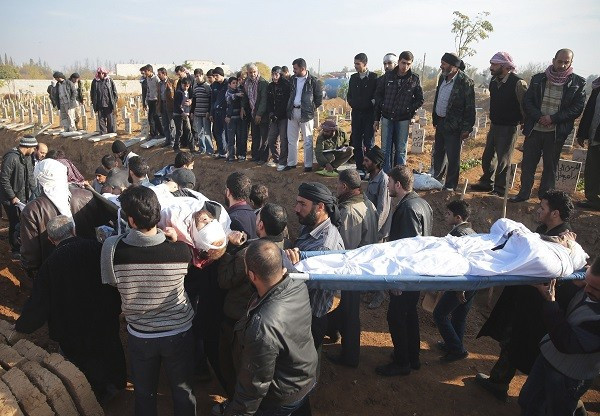Stop Al-Qaida's Infitration on the Internet - or More British Jihadists Will Die in Syria
Incoherence and hypocrisy of extremist narrative must be stopped - or more British lives will be lost

The confirmation this week of a second British man killed in Syria has shed some light on a disturbing trend - that of young British Muslims travelling to Syria to take part in the Syrian civil war, which has now entered its third year. Mohammed El-Araj, who was 23 and from West London, was reported to have been killed in August in an attempted ambush on pro-Assad forces near Aleppo. Another Briton, Ibrahim al-Mazwagi from North London, was killed in February, after travelling to Syria having previously taken part in the Libyan conflict.
It is estimated that there are between 200 and 300 British citizens currently taking part in the civil war in Syria, in addition to several hundred fighters from other European countries, although no clear figures are available. While the main secular opposition grouping, the Free Syrian Army, has the broad support of European governments, as many as 90% of foreign fighters are said to have joined extremist jihadi groups, many of which are linked to al-Qaida, most notably Jabhat al-Nusra and the Islamic State of Iraq and Al Sham (Isis). Al-Qaida has, in the past, recruited Western jihadis radicalised overseas to commit terrorist attacks in their home countries, most notably in the 7/7 attacks. This makes the participation of young British citizens in extremist groups in Syria particularly worrying.
The phenomenon of young British Muslims taking part in conflicts overseas is not new. It is believed that hundreds of British citizens travelled to Afghanistan and Bosnia in the 80s and 90s, to fight in what they saw as the struggle of Muslims against Russian and Serbian oppression. However, the emergence of the internet as an ungoverned space for the dissemination of the extremist Islamist narrative, coupled with the identity crisis experienced by some Muslim youth in the West, has allowed for the latest wave of radicalisation to be conducted on a far wider scale, resulting in a much faster internationalising of the Syrian civil war relative to previous conflicts.
The extremist narrative of Western oppression of Muslims has effectively been used to encourage a younger generation to take part in a war in which Muslims are killing Muslims on a horrific scale, with frequent reports of atrocities such as the execution of unarmed civilians perpetrated by all sides. The appeal of adventure and danger, and the opportunity to belong to a movement which purports to represent their Muslim identity is a powerful draw to idealistic young men with a sense of alienation from British society, and a frustration at the failure of the West to prevent the killing of Muslims in Syria and other areas. Of course, such a narrative - that simultaneously condemns Western intervention in former conflicts and condemns the lack of it in Syria - does not stand up to rational argument, but it has nevertheless clearly been persuasive to vulnerable minds, rightfully outraged at events in the Middle East.
The internet has been used effectively by al-Qaida and related groups to spread their narratives. Marginal religious scholars, often self-proclaimed, have been able to gain wide audiences online for takfiri proclamations, which declare certain individuals or groups to be non-Muslim for the purpose of legitimising their killing, which has happened in the case of Shia Muslims in Syria. There is now an urgent need for greater investment in challenging extremism online, as well as in the 'real world'. This can be done in part by establishing a strong positive narrative which helps British young people at risk of radicalisation to integrate into British society, and to challenge the extremist narrative that is now effectively promoting the large-scale killing of both Muslims and non-Muslims.
At the same time, it would be wrong to consider all British fighters in Syria as a terrorist threat to the UK on their return. Although the Terrorism Act 2006 allows for the prosecution of those who have taken part in extremist activity overseas, permitting former fighters to return to their jobs and families without harassment from the law, as for example many former fighters in Afghanistan did, would be likely to help toward their deradicalisation. The trouble for the security services, as their chiefs explained in the televised select committee earlier this month, is in knowing which ones pose a real threat. In the meantime, it is essential to expose the incoherence and hypocrisy of the extremist narrative, and provide strong credible alternative models for participation in British society.
Ed Swan is Programmes Officer at the Quilliam Foundation, the world's first counter-extremism think tank. Visit the Quilliam website to find out more
© Copyright IBTimes 2025. All rights reserved.



















